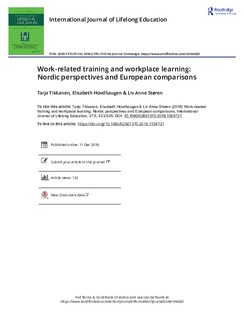Work-related training and workplace learning: Nordic perspectives and European comparisons
Journal article
Published version

View/
Date
2018-12-11Metadata
Show full item recordCollections
- 9 - Other / Annet [202]
Original version
Tikkanen, T. I.; Hovdhaugen, E.; Støren, L. A. (2018). Work-related training and workplace learning: Nordic perspectives and European comparisons. International Journal of Lifelong Education, 37(5), 523-526. 10.1080/02601370.2018.1554721Abstract
Work-related training and non-formal and informal workplace learning are increasingly being recognised as a key to lifelong learning and to realising the potential for skills development. Globalisation, technology change with further digitalisation, together with demographic change and climate changes are transforming the world of work. This special issue is born out of collaboration between two large research projects, Barriers and drivers regarding adult education, skills acquisition and innovative activity (BRAIN) and Skills development for realizing the workforce competence reserve (SkillsREAL). The projects were financed by the Research Council of Norway, but both included an international group of researchers. These projects also had other commonalities. The focus of research in both were on relationships between learning, skills and competences, exemplified in the work setting, and both used data primarily, but not only, from PIAAC – the OECD survey Programme for the International Assessment of Adult Competencies (OECD, 2013). The main difference between the projects was their target group: SkillsREAL concentrated on young adults, immigrants and older adults, while BRAIN focused on the working population more generally. The articles in this special issue explore work-related training and workplace learning in the Nordic countries, comparing findings across these countries, and with several other European nations.